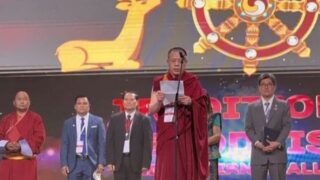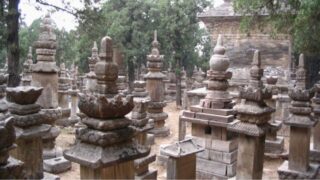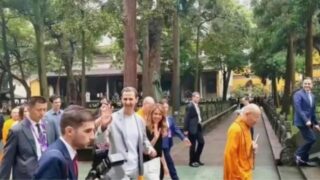Over the past few months, multiple Buddhist and Taoist temples were forcibly dismantled or shut down in Hubei Province.
By Cai Congxin
Authorities in the central province of Hubei continue suppressing Buddhist and Taoist faith by forcibly demolishing and shutting down temples, claiming that they are “unlicensed” religious venues.
Temples forcibly dismantled
On September 6, believers in Xintan town under the jurisdiction of Hubei’s Honghu city attempted to stop government personnel from demolishing the town’s Tianfu Temple. One of the officials proclaimed at the site that according to the state’s policy, all religions must be banned. The temple’s guard was forcibly removed, and soon the temple was turned into ruins.


On August 22, the government of Yanwo town under the jurisdiction of Honghu city issued an order to demolish all the temples in town. Five days later, Buddhist Foguang Temple was destroyed. Initially built during the reign of the Qing dynasty (1644-1911), it was razed to the ground for the first time as the Cultural Revolution swept through the country. Later, local Buddhist rebuilt it with the money they had raised.


Taoist Qitian Temple in the town was also forcibly destroyed, even though local believers sealed it off in an attempt to protect it.
“The CCP wants to eradicate all religions, and nobody could do anything about it. All the churches and temples could have been already destroyed if the government ignored entirely the claims from abroad that human rights are not respected in China,” a local official said.
Buddhist Xianfeng Ancient Temple in the Datong Lake management area of Honghu city was demolished on September 3. Local believers revealed that the temple was built at the cost of 300,000 RMB (about $ 42,000), raised by local villagers.


“It is doomed to be demolished if the government decides to do so, and no one can challenge this,” a local Buddhist said helplessly. “Current religious policies are as strict as during the Cultural Revolution. No one is allowed to practice their faith. Xi Jinping is following Mao Zedong’s steps to force everyone to worship him.”


Believers arrested for petitioning the state
Most of the congregations of the demolished temples didn’t dare to protest the government’s actions, fearing retaliation. Some, however, tried to defend their rights by petitioning the authorities.
Three years ago, Guanying Ancient Temple, a Buddhist place of worship in Liangzihu district of Hubei’s Ezhou city, was listed for demolition to build a road, the government promising to allow the construction of a new temple afterward. The owner of the temple and local Buddhists had raised funds and built a new temple, but in May 2018, the local government converted it into a cultural activity center, claiming that “the state’s policy doesn’t allow the construction of temples.”
Since the state has not compensated for the demolished and then repurposed temple, the owner and some believers decided to petition the local and central governments. They not only didn’t receive any compensation but were arrested on July 18 and taken in for questioning at the local police station. The owner was detained for 11 days and two believers for five days for “disrupting order.”
Temples sealed off
Numerous temples were also subjected to forced shutdowns. On June 28, the government ordered to seal off Xiuling Temple in Huangshi city’s Tieshan district. The Buddhist temple was already closed down in October last year, and two female believers in their 60s who used to live there were evicted. Since one of them, who was also in charge of the temple, had nowhere to live, she often secretly sneaked to stay in the temple.
Upon discovering her, officials ordered to seal off the temple’s doors and windows, to “avoid any troubles in the future.”


Two Buddhist temples – Guanyin Cave Temple in Huangshi city and Quantang Temple in Taizi town have also been shut down.











